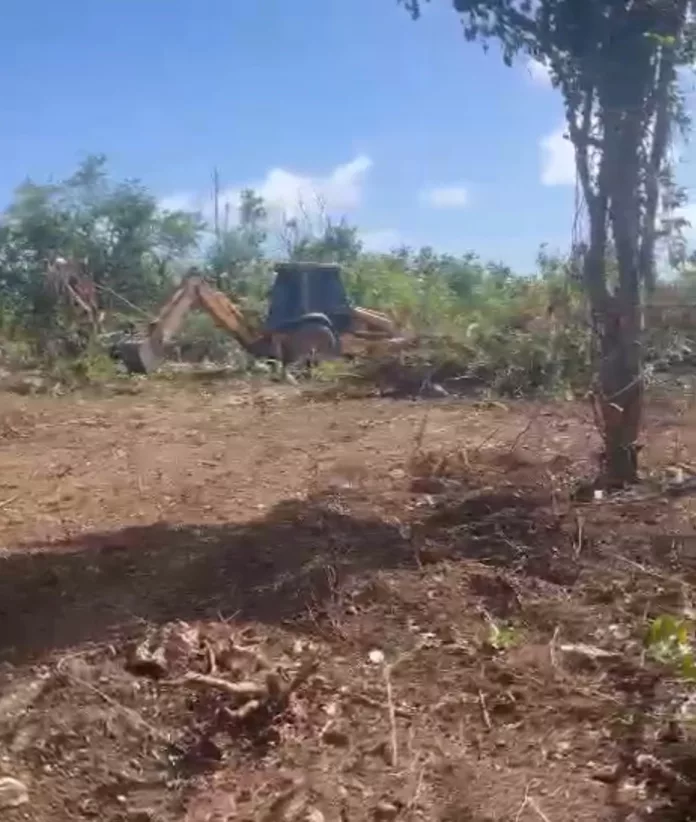By Gemma Handy
Tension is intensifying between dozens of farmers who have been using land at Burke’s Estate for years and authorities trying to move them to make way for housing.
Yesterday, agriculture officials admitted to Observer the farmers had been placed in the privately-owned area “by mistake”.
The ministry’s Owolabi Elabanjo said the error had arisen because the relevant parties failed to check precisely who owned the land.
“We have met with the farmers and we have committed to moving them so that they can continue their work,” he added.
But one of the farmers told Observer that the “40-plus” people working the land with crops and livestock would not budge.
“We are not intending to move,” Emmanuel Peters, President of the Layer Farmers Association, said.
Peters said some of the farmers had occupied the site for generations and had been paying leases to the ministry for the right to do so.
“No one has spoken to us yet about compensation packages,” he noted.
He added that an alternative site the farmers had been offered was “less desirable” due to the quality of the soil, among other factors.
The farmers’ plight arose recently when some were given 28 days’ notice to vacate by the Development and Control Authority (DCA).
It’s the latest controversy surrounding land traditionally used for agriculture but earmarked for social housing in recent weeks.
Many people have bitterly protested an impending development at Dunbars, claiming the move puts the boot into food security as well as farmers’ livelihoods.
Meanwhile, the owner of the land at Burke’s told Observer yesterday he has been embroiled in talks with the farmers for two years – and that his housing project has been three decades in the making.
D’Angelo Christian, managing director of House Antigua Ltd which has owned the 100-acre site for 30 years, said the private venture has long been beset by political wrangling.
That was exacerbated further by a long-standing conspiracy that the land had been bought for a peppercorn price, he explained.
The development was initially going to be undertaken by Christian’s grandfather. Christian has since reconceptualised it with a range of eco-friendly features and earned the stamp of approval from government.
Work is already underway preparing the infrastructure which means the area is now “hazardous” to the farmers, he explained.
Christian said the farmers had subsequently been approached by the DCA with regards to vacating.
“Of course you are going to get resistance from some, which I understand. I never realised it would become a big public topic as it is a private matter but we are trying for a peaceful transition,” he explained.
Christian said he is sympathetic to the farmers’ plight and had offered some the option to purchase the land they occupied, along with his company’s help to build on it.
“I don’t want the public to think the relevant bodies are not trying to find a way for these farmers,” he continued.
“I have been desperately trying to find ways and means, even between Agriculture and the DCA, to help them relocate to an area that is more appropriate for farming.”
He said he believed compensation was befitting for those who had dutifully been paying their leases.
A DCA spokeswoman told Observer that enforcement notices had been given to two farmers whose sites were in the way of road works being carried out.
“It is private land which means there is a squatting issue,” she said. “The government is working to relocate the farmers to a more suitable place.”
She added that government land was available to the east of the farmers’ current location.
For his part, Christian said he’s keen to help his compatriots get a foothold on the property ladder. His development will eventually comprise as many as 300 houses priced from EC$160,000 to EC$200,000.
Homes can be customised to suit purchasers’ budgets and designed using his in-house team of architects.
Concrete roads, underground utilities, sidewalks and drains will all be completed before construction on the first 50 properties begins.
“I want to encourage the general public to be a part of this project,” he said.
“It’s 100 percent local and we are looking at sustainable solutions from the water treatment systems to solar power, while integrating the land’s natural reserves like streams and trenches.
“I want to create a very sustainable place that can help combat climate change and contribute to beautifying and making Antigua a better place.”

